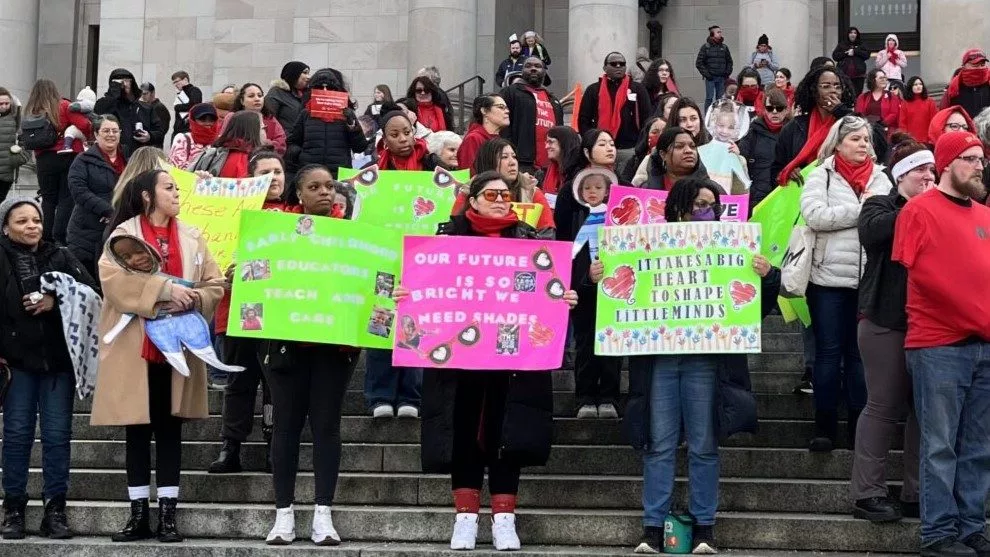OLYMPIA, WA – Nearly 15 years ago, Washington state lawmakers approved a plan to make a state-funded early learning program an entitlement for all low-income families who qualify.
Since then, that plan has been delayed three times.
As lawmakers face a multibillion-dollar budget hole over the next four years, it’s becoming clearer that they will likely need to again push off the expansion — currently set to take effect in the 2026-2027 school year.
“I am not thrilled to bring this to your attention,” House Appropriations Committee Chair Timm Ormsby, D-Spokane, said in a public hearing earlier this month. “It is a response to the fiscal reality that we are in.”
Washington’s Early Childhood Education and Assistance Program provides free part-day and full-day preschool and other services related to mental health, nutrition and family support for 3- and 4-year-olds in low-income families. As of last year, the program served more than 16,000 children in more than 480 locations across the state. The Department of Children, Youth and Families estimated that the state would need another 14,000 slots once the entitlement was fully implemented in 2031.
To be eligible, families must earn no more than 35% of the state median income. That’s $47,179 for a family of four, as of October. Some children whose families are over that limit may also be accepted if they meet other criteria, like being homeless, having parents who are incarcerated, or having developmental delays.
“We are serving our most vulnerable population,” said Michelle Rahl-Lewis, director of early learning for Tacoma Public Schools. “One of our biggest goals is just really teaching the students how to self regulate and supporting our families in their own growth.”
But offering the services for free is expensive, and in a year where lawmakers are looking for ways to fill a budget gap, delaying a further expansion of the program could provide significant savings for the state.
‘Not a step back’
A bill sponsored by Ormsby and requested by the Office of Financial Management would delay the entitlement until the 2030-2031 school year. At that point, it would become available to any family with an income at or below 36% of the state median. Starting in the 2034-2035 school year, any family with an income at or below 50% of the state median income would qualify.
Ormsby’s bill would also delay expansions planned for Working Connections Child Care, the state’s subsidy program.
The proposed delays align with budget proposals from both former Gov. Jay Inslee and Gov. Bob Ferguson. In Inslee’s budget, the delay of the Early Childhood Education and Assistance Program accounted for nearly $146 million in savings through 2027. Delaying the state subsidy expansion would save another nearly $120 million.
“This is a tough time,” Sheri Sawyer, with the Office of Financial Management, told the House Appropriations Committee this month. “You all are going to grapple with difficult decisions, and this is one more option for you to consider.”
Ormsby emphasized that a delay is not a funding cut. “This is not a step back,” he added. “We’re not taking away benefits that are currently occurring.”
Rahl-Lewis said any cuts to current funding would be “catastrophic” to Tacoma’s program and many like it that families depend on.
Early Childhood Education and Assistance Programs offer more than child care, said Stephany Contreras Roman, an early learning teacher in Tacoma. She said the program’s teachers often wear many hats, like nutrition specialist, family support and interpreter.
“We’re not just teachers,” she said. “ This is not just a one-role job.”
Push for higher pay and benefits
Some early learning advocates said they were expecting to have to pause the entitlement implementation regardless of the budget situation because there aren’t currently enough providers to handle an influx of new children who would be eligible.
To recruit and retain more providers, advocates continue to push for higher pay and benefits for early learning and child care workers.
Inslee’s budget proposed an 18% rate increase for Early Childhood Education and Assistance Program providers, but that too could be undermined by the budget crunch.
Budget talks won’t fully ramp up until mid-March after lawmakers get updated revenue estimates. Until then, agencies continue to look for ways to cut spending per a request from Gov. Bob Ferguson.
This story first appeared on Washington State Standard.
